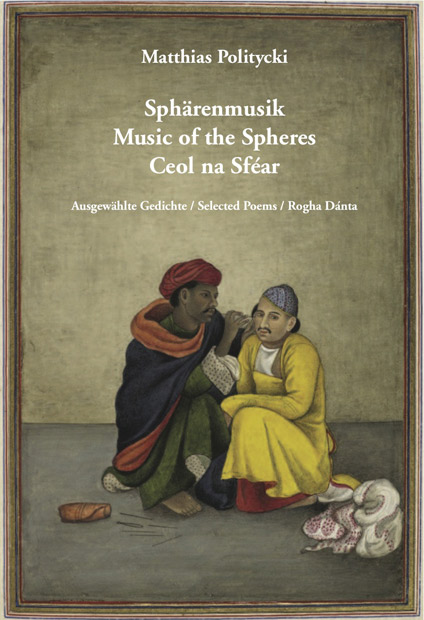 Sphärenmusik – Music of the Spheres – Ceol na Sféar
Sphärenmusik – Music of the Spheres – Ceol na Sféar
Sphärenmusik – Music of the Spheres – Ceol na SféarAusgewählte Gedichte – Selected Poems – Rogha Dánta
published 2011 by Coiscéim, Dublin
http://www.coisceim.ie
118pp, paperback
€ 9,-
– Die Sekunden danach
published in:
– Ratschlag zum Verzehr der Seidenraupe
published in:
– Ratschlag zum Verzehr der Seidenraupe
published in:
– Die Sekunden danach
aus/from/as: Ratschlag zum Verzehr der Seidenraupe
Was dürfen wir hoffen? Was sollen wir glauben? Was können wir tun?
What may we hope for? What shall we believe in? What can we do?
Cad leis is féidir a bheith ag súil? Cén rud a ngéillfimid dó? Cad is féidir dúinn a dhéanamh?
Bauer im Reisfeld
Peasant in a paddy field
Tuathánach i ngort ríse
Ratschlag zum Verzehr der Seidenraupe
Advice on the consumption of silkworms
Comhairle maidir le seiriceáin a ithe
Nicht schön
Not nice
Ní deas
Touristen
Tourists
Turasóirí
Summe meiner Fehlfahrten
The sum total of my misadventures
Cuntas iomlán orm féin mar straeire
Jeden Tag
Every day
Gach lá
Schlechte Gedichte auf den Süden
Bad poems about the south
Drochdhánta faoi na críocha ó dheas
Wohin, wenn nicht jetzt?
Where to if not now?
Cá háit munarb é anois é?
Halt’s Maul und sei schön!
Keep your trap shut and be beautiful!
Dún do chlab agus bí go hálainn!
Frauen. Naja. Schwierig.
Women. Well now. Difficult.
Mná. Sea ambaist. Casta.
Halt’s Maul und sei schön!
Keep your trap shut and be beautiful!
Dún do chlab agus bí go hálainn!
Sonntagnachmittagserklärung
Declaration on a Sunday afternoon
Forógra tráthnóna Dé Domhnaigh
Schlußworte, kubanisch
Parting words, Cuban style
Focail scoir, an nós Cúbach
Die Strafe
The punishment
An pionós
Sphärenmusik
Music of the spheres
Ceol na sféar
Beim nächsten Bier wird alles anders
After the next beer everything will be different
Beidh gach aon rud difriúil leis an gcéad bheoir eile
aus/from/as: Die Sekunden danach#
Das leichte Leben
An easy life
Saol breá bog
Schwupp
Whoosh
Húúúis
Nie wieder Deutschland
Never again Germany
An Ghearmáin go deo arís
Die Guinness-Parabel
The Guinness parable
Parabal Guinness
Kirschblütenfest
Hanami
Féile na mBláthanna Silíní
Ein Vorbild
A role model
Eiseamláir
Goldener Oktober
Golden October
Deireadh Fómhair Órga
Trotzdem
For all that
Ina dhiaidh sin is uile
Was dagegen hilft (♀)
What profits ♀
Cad is fiú ♀
Was dagegen hilft (♂)
What profits ♂
Cad is fiú ♂
Erst hast du kein Glück
First you have no luck
Gan sciorta den ádh a bheith ort ar dtús
Eines noch
One more thing
Rud amháin eile
Schön, daß du wieder da bist!
Good to have you back!
Is maith go bhfuil tú ar ais!
Der ideale Tag
The ideal day
An sárlá
Die Umarmung
The embrace
An bharróg
Wilder Rhabarber
Wild rhubarb
Biabhóg fhiáin
Was fehlt
What’s missing
A bhfuil in easnamh
Die Sekunden davor
The seconds before
Schlußbilanz
Closing balance
What profits (♀)
Early up, out and about,
look over the water,
sniff at coffee beans,
paint your toenails,
go to the hairdresser,
and otherwise: tears, hot-water bottles and rebirth.
Somewhat helpful:
talk about it lots,
change your GP,
pull up your stockings,
finish off those chocolate Nicholasses from the year before,
and according to your whim these parting words: And please
never phone me again.
Not at all helpful:
encouraging words,
power shopping,
camomile tea, fennel tea, green tea,
least of all: your firm resolution
to flirt with complete strangers.
In the end, however, maybe
everything is of some profit,
though paltry
and only for a while.
Cad is fiú (♂)
Roinnt comhairle a bhailíos ó chairde fir
Cuir ort do chulaith Dhomhnaigh,
smaoinigh ar dhroch-chríoch a scanródh thú,
déan liosta,
déan iarracht,
ná téigh isteach ón ngrian,
is seachas sin: bí ciúin ina thaobh, leis na daoine cearta.
Cuibheasach cabhrach:
ná bearr,
ná léigh an nuachtán,
éist le ceol ard,
lig do dhaoine eile cócaráil duit,
agus socraigh a rá le bean bhreá éigin: brón orm,
níl aga agam air.
Gan a bheith cabhrach in aon chor:
fanacht sa leaba,
an t-ól a sheachaint,
caitheamh aimsire a thosú, nó
ciarsúr póca comhoiriúnaithe ó thaobh dath a lorg,
is lú cabhair: gan aon chathú a bheith ort,
iad a chrúbáil.
Sa deireadh
ní fiú aon ní.
Matthias Politycki is one of the most important German-language writers of today, in the realm of fiction as well as poetry. As a self-confessed ‚postmodern romantic’, he deals with the adventures of everyday life, love and travel – death constantly in the background. Critics praise his lyrical output for its formal variety (from the sonnet to free verse to concrete poetry), for its artistry, playfulness, humour and wit. A combination of light-footed irony and serene melancholy makes his poems very accessible. Politycki’s passion for the absurd echoes the works of well-known poets such as Christian Morgenstern, Kurt Tucholsky, Erich Kästner, Peter Rühmkorf and Robert Gernhardt, and yet this very male author, by coupling the lofty and the low, cheekiness and tenderness, respect for tradition and modish jargon, reflection and experience, succeeds in producing a sound all of his own.
Is é seo an 11ú leabhar trí-theangach sa tsraith seo. Filíocht ón Ghearmáin, 35 dánta saoithiúil cliste le leaganacha Gaeilge is Béarla ina gcuideachta. Tá Matthias Politycki mar dhuine de na bhfílí is tábhachtaí ár linne a bhfuil neart duaiseanna agus dámhachtainí buaite aige. Tá breis le 200,000 leabhair dá chuid díolta (filíocht & úrscéalta).
[Politycki’s poems] range from the conventional sonnet form to more informal styles, and are concerned with everyday life, love and travel. Underlying his seriousness is a sense of irony and fun.
(Books Ireland, April 2012)
„Politycki’s poetry requires careful reading and gives much to think about it. Gut, good, go maith“
(Pól Ó Muirí, The Irish Times, 18/2/2012)

